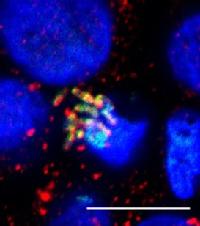Salmonella could be combated by enhancing body’s natural process
· Salmonella can be combated by Autophagy, a cellular recycling process according to researchers at the School of Life sciences at the University of Warwick.
· Autophagy could also prevent other bacteria such as Mycobacterium tuberculosis, Shigella and Staphylococcus from developing.
Autophagy – the process of recycling cellular material in the body, can help combat Salmonella and other pathogens according to researchers at the School of Life Sciences, University of Warwick who have studied how autophagy can get rid of bacteria, and prevent diseases developing.
An interdisciplinary team of researchers led by Dr Ioannis Nezis from the School of Life Sciences, University of Warwick, and Dr Tamas Korscmaros from Earlham Institute and Quadram Institute, Norwich, UK screened the proteome from 56 pathogenic bacterial species – to see how autophagy reacts with them.
Some of the 56 species screened included Salmonella, Shigella, Listeria, Mycobacterium tuberculosis and Staphylococcus. They identified how host cells use autophagy to clear invading bacteria, but also how bacteria use their proteins to escape this clearance.
They found that host cells use autophagy to target specific bacterial proteins for recycling. These bacterial proteins could be used by the bacteria to help them escape their clearance.
Salmonella is a food born pathogenic bacterium and it is the second most common cause of childhood mortality in the developing world. Understanding how host cells sense and combat Salmonella infection would lead to new therapies. They identified Salmonella YhjJ protein which interacts with autophagy protein LC3 and can cleave other autophagy proteins to inhibit their function.
Dr Ioannis Nezis commented:
“Our systems-level analysis has highlighted the complex interplay between host autophagy and bacteria to inspire future experimental studies to elucidate the detailed molecular mechanisms of autophagy in the pathogenesis of bacterial infections.
“With drug resistance being on the rise worldwide, bacterial infections pose one of the greatest global threats to human health. Using activators of autophagy with antibiotics, as antibiotic resistance breakers, would be a very promising way to fight bacterial infections”
Research can now look at identifying natural products that can boost autophagy and decrease the likelihood of developing infections as well as treating them.
For previous research of Nezis’ group (see https://warwick.ac.uk/newsandevents/pressreleases/colon_cancer_breakthrough )
The paper, ‘Targeted interplay between bacterial pathogens and host autophagy.' by Padhmanand Sudhakar, Anne Claire-Jacomin, Isabelle Hautefort, Siva Samavedam, Koorosh Fatemian, Eszter Ari, Leila Gul, Amanda Demeter, Emily Jones, Tamas Korcsmaros and Ioannis P. Nezis, is published in Autophagy journal on 26/03/2019
It is funded by the Biotechnology and Biological Sciences Research Council.
ENDS
26 MARCH 2019
NOTES TO EDITORS
Paper is available to view at: https://www.tandfonline.com/doi/full/10.1080/15548627.2019.1590519
Image available to view at: https://warwick.ac.uk/services/communications/medialibrary/images/march2019/iaonnis_autophagy.jpg
FOR MORE INFORMATION PLEASE CONTACT
Alice Scott, Media Relations Manager, University of Warwick
Tel: 02476 574 255 or 07920 531 221
E-mail: alice.j.scott@warwick.ac.uk
FOR MORE INFORMATION PLEASE CONTACT
Alice Scott, Media Relations Manager, University of Warwick
Tel: 02476 574 255 or 07920 531 221
E-mail: alice.j.scott@warwick.ac.uk
